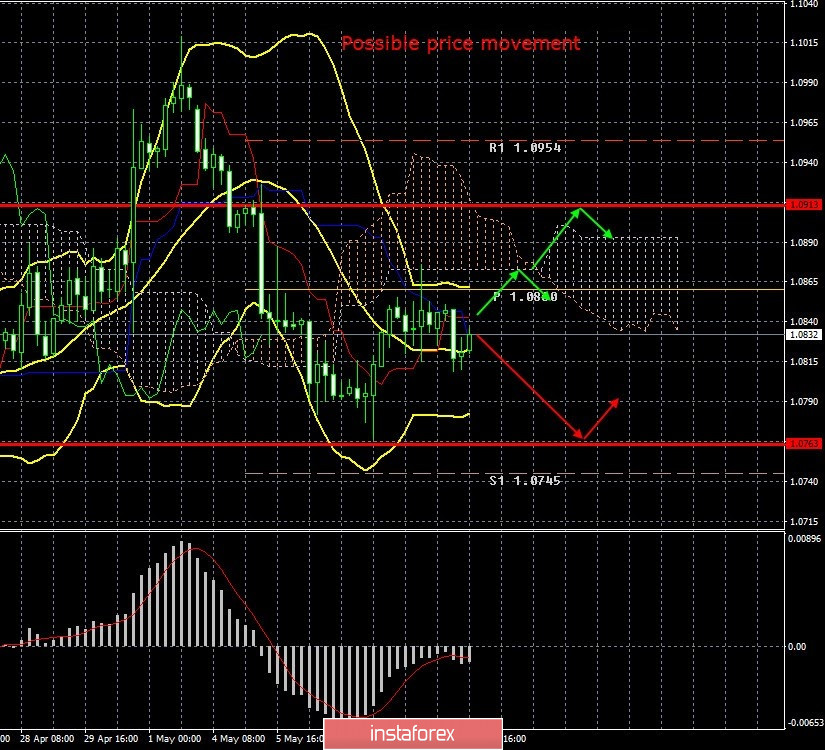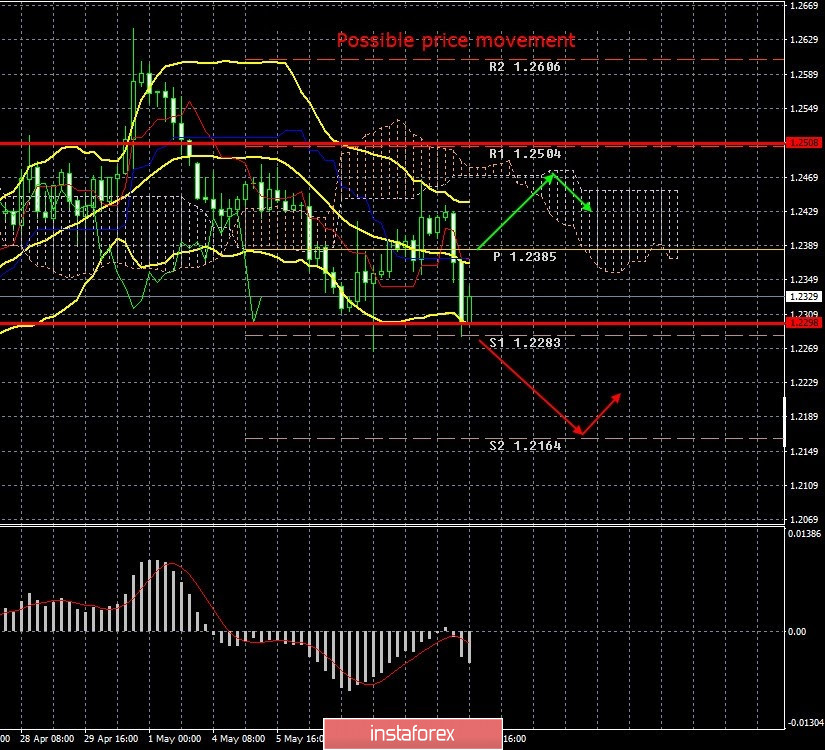4-hour timeframe

Average volatility over the past five days: 75p (average).
The EUR/USD currency pair was trading incoherently again on the first trading day of the week. However, this is absolutely normal for Monday. No important macroeconomic information was published that day, significant fundamental information that could affect the movement of the pair and the mood of traders was also not received. Thus, the general volatility of the day within 42 points is an absolutely expected phenomenon. Market participants are again waiting for important messages and news, and at this time continue to trade the pair inside a fairly wide side channel, limited by levels of 1.0750 and 1.1000. The lower boundary of this channel has already been worked out three times, and the last time this happened at the end of last week. Thus, from a technical point of view, we expect an upward movement in the area of the psychological level of $1.10, and a new downward trend to form, not before overcoming the area of 1.0740-1.0750.
Meanwhile, a split among EU members and its leadership continues to mature and grow. According to the latest information, the European Commission may impose sanctions on Germany for violating the laws of the European Union. This was stated by President of the European Commission Ursula von der Leyen. Naturally, this is a response to the decision of the Federal Court of Germany on the ECB, which allegedly violated the laws of Germany by redeeming bonds. "I take this matter very seriously. Based on the available information, we study the next steps up to the procedure for violation of the agreements, "said von der Leyen. She said that in any case, the final word rests with the European Court. Recall that the German court considers that the purchase of bonds by the Bundesbank since 2015 takes place without the participation and approval of the German government, which contradicts German laws. The ECB's actions, according to the German Court, "deprive Berlin of economic sovereignty." The Bank of Germany was already prohibited from participating in the further purchase of bonds under the ECB program until the ECB itself proved the legitimacy of its actions and decisions.
Thus, the split between the north and south of the eurozone continues to grow. Earlier, we have repeatedly said that the main stumbling block now lies in the recovery of the European economy from the consequences of the COVID-2019 pandemic. Germany, which is considered the locomotive of the EU economy and, according to some opinions, controls the entire economy of the European Union, refuses to pay for the mistakes of the "southern countries" that did not create reserve funds for a rainy day, spent too much and did not optimize their own budgets. At this time, the EU government has no choice but to look for ways to help the most affected countries, each of which suggests that the richer countries, that is, the northern ones, that is, Germany, Austria, the Netherlands, Finland and others, will pay for this restoration. Naturally, such a state of affairs is not liked by the Nordic countries themselves, which are blocking initiatives like crown bonds, and are in favor of creating a separate fund that will lend and finance countries affected by the pandemic on special conditions. Well, poorer countries that need help believe that the "northerners" should help them, since they all represent the European Union.
Owing to these events, Italy may initiate its withdrawal from the EU, and even Germany could begin the process of withdrawal from the bloc. Especially if now the European Commission imposes fines on it or applies other sanctions for violating existing European legislation. The European Commission considers that the German court did not have the right to prohibit the Bundesbank to suspend the purchase of bonds held by the ECB.
Meanwhile, more and more experts believe that the "instigator" itself, China, will be least affected by the current pandemic crisis. First, China has already managed to curb the spread of infection, and, according to official figures, there are practically no new cases of the disease recorded there. The economy of China has already begun to recover, while the European and American economies continue to decline. At the end of 2020, the Chinese economy may show growth of 1.2%, while the American and European economies will lose from 5% to 10%. Secondly, the Chinese economy is manufacturing, the European and American economies are the service sector. During the crisis, it was the services sector that initially collapsed, which is clearly seen in business activity indices, which fell both in the United States and the European Union to almost zero. But in China, the share of the real sector of the economy is above 40%. The service sector declined, of course, in China, but less affected the overall economic decline. Thus, according to the results of the next global crisis, China may come out with the least losses.
And the most interesting question is what America will do with it, for which China is the main adversary on the world stage. Two years ago, Donald Trump made it clear that he would fight with China. Obviously, if Trump is re-elected in November, then trade wars, international conflicts will continue, and the general geopolitical situation will continue to heat up.
4-hour timeframe

Average volatility over the past five days: 105p (high).
Unlike the euro, the GBP/USD pair began to sharply fall but also rebounded in the US trading session on May 11. It's hard to say what are the reasons for such active trading on the British pound on Monday, but the fact remains. The daily volatility at the moment is 154 points, which is one and a half times higher than the average value of the indicator. And this is considering the fact that no important information came from the United States today (otherwise the European currency would also be very actively traded) and from the UK. Thus, at the moment, the pound/dollar pair has again dropped to the lower boundary of the side 400-point channel and has increased its chances of getting out of it and forming a new downward trend. Quotes still need to overcome the area near the 1.2230 level. Only then can we conclude that the pair left the side channel and consider the option with forming a downward trend. But another rebound from this area may trigger a new round of upward movement inside the side channel. As a result, the situation for the GBP/USD pair did not change much on Monday, although the downward movement was unexpected. Rebounds from the volatility level of 1.2298 and the support level of 1.2283 may trigger a round of upward movement.
Recommendations for EUR/USD:
For short positions:
The EUR/USD pair continues to adjust on the 4-hour timeframe. Thus, it is recommended to consider selling the euro with targets in the range of 1.0750–1.0740 in the event of a price rebound from the Kijun-sen line. Formally, a rebound happened today, and the MACD indicator turned down, however, in principle, all the movement in recent days is not too confident and clear. Overcoming the range of 1.0750–1.0740 will help keep sell positions open with the target of 1.0717.
For long positions:
Long positions will become relevant for the purposes of the volatility level of 1.0913 and the resistance level of 1.0954, when the price consolidates above the Kijun-sen and Senkou Span B lines.
Recommendations for GBP/USD:
For short positions:
The pound/dollar pair tried to resume the downward movement, but again rested in the area of about 1.2300. Thus, traders are advised to sell the pair with the target of 1.2200, if the level of 1.2283 is overcome. But even in this case, shorts are fraught with increased risk.
For long positions:
It is recommended that purchases of the GBP/USD pair be considered with the objectives of the Senkou Span B line and 1.2504, but in small lots if the Kijun-sen line is again overcome.
Explanations for illustrations:
Ichimoku indicator:
Tenkan-sen is the red line.
Kijun-sen is the blue line.
Senkou Span A - light brown dotted line.
Senkou Span B - light purple dashed line.
Chikou Span - green line.
Bollinger Bands Indicator - 3 yellow lines.
The MACD indicator is a red line and a histogram with white bars in the indicators window.
Classic support / resistance levels - red and gray dashed lines with price symbols.
Pivot level - yellow solid line.
Volatility levels are red solid lines.
Possible price movement options:
Red and green arrows.





















